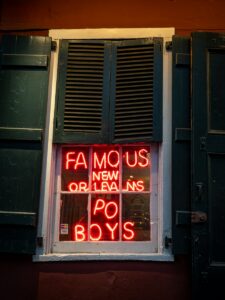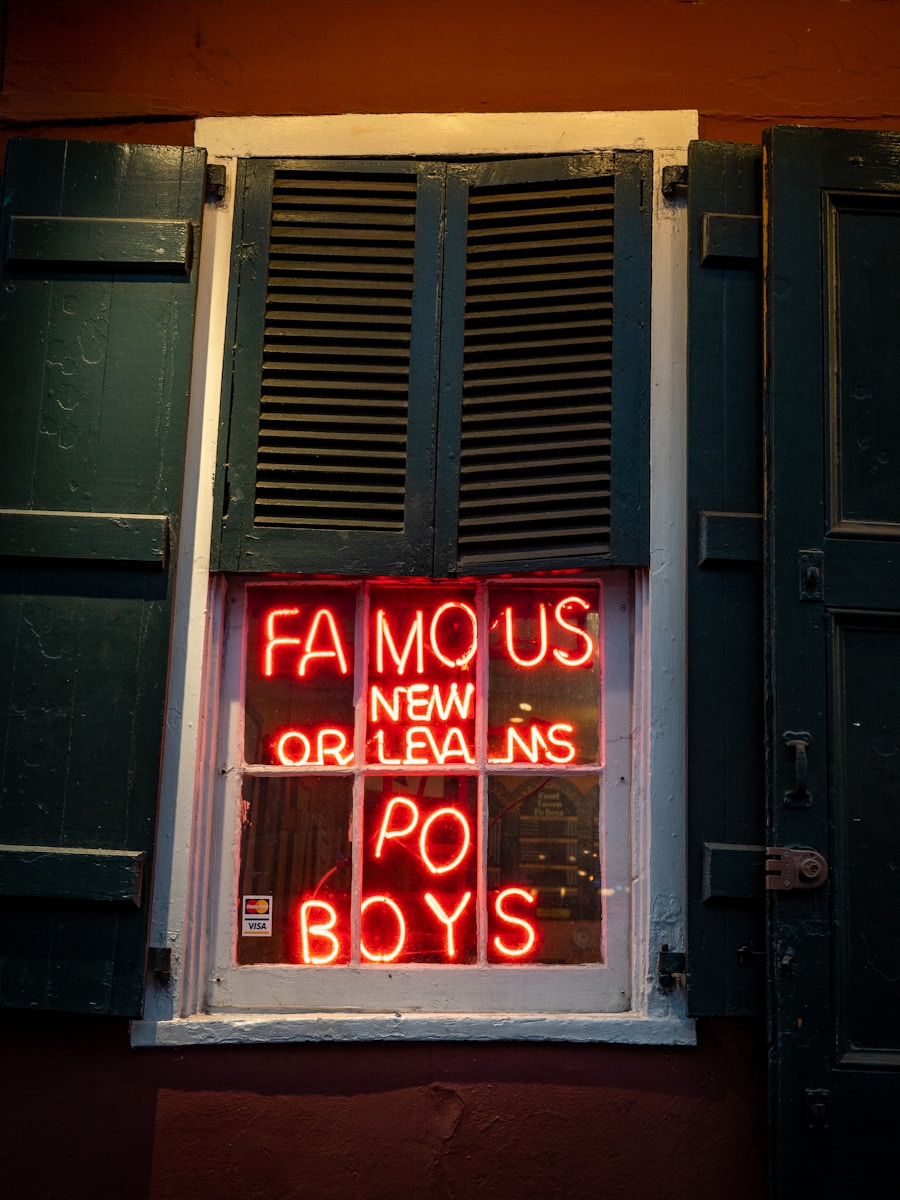The French Quarter
Billy and Rosie leave the restaurant. Once on the sidewalk outside, Rosie takes Billy’s hand and they start the five-block walk to The Funky Pirate, a popular New Orleans blues club just off Bourbon Street.

“So, when do you leave for Washington?” Rosie casually asks.
“Tomorrow, we go to meet Sam. I’ll leave the next morning.”
Rosie says, “So that’s what the call in the restaurant was all about?”
Billy slings the green knapsack up and hangs it off his shoulder. “Yes,” he replies.
Rosie looks chagrined. “What do I do while you’re away?
Billy just smiles. “I already told you. I’m going to take you out to meet Sam. You’ll like him Rosie, trust me. He has the place out on Lake Pontchartrain. He’s a bachelor—lives alone in a big southern plantation-style house—and he could use a little company. I’m sure he’ll enjoy the companionship of a young woman as good looking as yourself. Besides, he has a high-tech security system protecting the whole property—electric fences, cameras, and a couple of mean old junk yard dogs. I will feel a lot better if I know you are safe. You can’t stay by yourself out at the boat.”
“Why does Sam need such a sophisticated security system?” Rosie asks.
Billy is matter of fact. “If you’ve made as much money as Sam has in the rough and tumble oil business, you just naturally accumulate some determined enemies along the way.”
“I see.”
Rosie though is genuinely touched. “Thank you, Billy, for your concern,” she says, in her most sincere voice. Then: “Are you going to let me keep the Glock?”
“Absolutely,” Billy responds. “Sam has his own shooting range. The two of you can take some target practice together. Sam’s a good shot. He’ll probably try to give you some more lessons. He’s the one who taught me to shoot.”
“How come he never married?” Rosie asks curiously.
Billy just shrugs. “Sam doesn’t like partners. He never had one in business—and for good reason. He has always said that business relationships are tough enough. Marriage, he always thought, would be an impossible contract to live up to.”
Rosie replies, “Well, from everything you’ve told me, I’m looking forward to meeting the man.”
“You will tomorrow,” Billy says. “But first we have to get you a new identity.”
The Kremlin, Moscow
It is 10:30 PM in Moscow. The president of Russia had earlier attended a reception in the Grand Kremlin Palace for officials from the Crimea, but now he is in his Kremlin office. He has just finished a late dinner. He is alone having a drink and he is not happy. It has been two days, and he has not heard a word from his two operatives in New Orleans. It is not like Oleg (one of the dark suits) to not regularly check in when he is on an assignment. It is as if the two Russian henchmen have just disappeared off the face of the earth.
Tsar Peter pushes the button on the phone that is his direct line to the president of the United States. The Russian president always gets impatient with these international calls to the White House. The connection goes through a Kremlin server, makes a satellite link, and passes through numerous back channels, including the Russian embassy in Washington, before coming to the phone on the president’s desk in the Oval Office.
It is 2:30 PM in Washington D.C. The Bad King waits for a couple of rings before he picks up the phone. He, too, is not happy. He has already taken two irate calls from the Russian president in the last three days. He expects again to suffer more of the Russian president’s wrath, his ill mood and abuse. His whole life—due to his father’s money—he has been the top dog. Now it’s tough to always be the bitch on the bottom the American president thinks.
At the beginning of his administration, the U.S. president—in deference to his Russian counterpart—delayed for more than a year imposing a set of economic sanctions that had been passed almost unanimously by the Congress as punishment for Russian meddling in the 2016 election. Now—after a recent firestorm of political controversy, and more delay—a besieged U.S. President is being forced to impose a new and even harsher regime of sanctions for Russia’s continued meddling in our U.S. election process—most notably the 2018 mid-terms. The new set of sanctions will impose a further enormous burden on an already crippled and struggling Russian economy; and it makes Tsar Peter livid. Also, it still irks the wily, authoritarian president when he thinks of the Ukraine and what he perceived to have been U.S. meddling prior to the outbreak of civil war.
Finally, The Bad King picks up the phone. “Hello,” he says in a wary, tentative voice. In the beginning of his administration, he had thought this open back channel (arranged by his son-in-law, known disparagingly, behind his back, as The Court Jester) was a good idea. Now he is no longer so sure.
The Russian president is again irate. “This is not how friends treat one another,” he begins the conversation in his slightly accented American English. At this point in their relationship, the U.S. president wants to say that he no longer considers that they are friends—but, of course, he does not dare. His Russian counterpart still holds all the cards—is the one on top in their relationship.
“Understand,” The Bad King starts to argue, “I am under enormous political pressure from the Congress and public opinion here in the United States, and there is only so much I can do. I delayed the sanctions for as long as I could,” he lamely explains. He knows, however, that the president of Russia does not care about his political problems or American public opinion.
“You must appreciate our relationship and observe our agreement, do not forget the kompromat or I will be forced to take measures that you will not enjoy—do you understand?”
The threat is explicit and real. “Yes, I understand,” the president of the United States mutters. He reminds himself—with considerable regret and some remorse—of the graphic and sexually explicit photos of himself with underage girls that so compromises his position with the Russian president. The president of Russia has even sent him a package of the pictures to keep as a sordid reminder of his past indiscretions and their relationship. The president of the United States burned the lewd photos in the fireplace in the Oval Office. But he knows, of course, that there are more incriminating copies in the Kremlin.
“Good then,” the Russian president says with finality. “Let us have no more misunderstandings.”
“Yes, sir.” The Bad King breathes a cautious sigh of relief. He remembers with sad wistfulness how, in 2013, while in Moscow promoting his Miss Universe pageant, he had been almost breathless to meet personally with the one foreign leader he most admired—Tsar Peter, the authoritarian Russian dictator. But the New York real estate developer—future American president—was pointedly snubbed. The invitation from the Russian dictator never came, only a disappointing consolation call from Dmitry Peskov, the Tsar’s personal spokesman.
“On another matter,” Tsar Peter continues, “what is being done to find the file—and the girl?” The president of Russia did not bother to mention that he already has two missing agents.
“I have my team working on it,” The Bad King replies. This is a lie. The president has asked FBI director Wray if the bureau has any information on the reporter’s disappearance, but he has not requested that any direct action be taken. The president does not trust the FBI, the CIA—or any of the nation’s intelligence agencies for that matter—and did not want a thorough investigation. Two cabinet officers—his secretary of state, and the acting defense secretary, plus his national security adviser and two generals on the Joint-Chiefs-of Staff—are all aware of the Project: Red Dragon file and support the plan to take over the government in a military backed coup in the event the fall election does not go in The Bad King’s favor. But otherwise, it is—he believes—a tightly held secret in the White House and halls of Congress.
The Tsar’s reply is swift. “Let me know immediately any results. If you can’t finalize this—then I will be forced to take matters into my own hands.”
With that final threat by the Russian president, the conversation ends, and the secure phone connection goes dead. The president of the United States sits there in his desk chair for a moment and ponders his situation. His relationship with the Russian president has decidedly deteriorated in the past few months. The Bad King is taking heat at home here in the U.S. for his past support of the Russian president, particularly for his humiliating bowing and scraping performance in front of the Tsar at the 2018 Helsinki Summit. And he remembers with some chagrin the firestorm of criticism leveled at him when he congratulated the Russian president—against the advice of all his advisers—for being re-elected to the presidency in 2018, in what was certainly a rigged and sham election. And then there was the divisive December 2018 shutdown of the government over the showdown with the Democrats on funding for the border wall.
The Funky Pirate Blues Club/ The French Quarter, New Orleans
Billy and Rosie stop outside the door to the club. Rosie now thinks this is getting all too bazaar and weirdly melodramatic.
Feeling frightened, she takes hold of Billy’s arm. “What are you talking about—a new identity?”
Billy smiles and opens the door. “You’ll see.”
The two of them then step inside the club. The band—a locally popular blues group—is between sets and the small bandstand is empty. Customers are seated around at tables, drinking, and quietly talking, and a hushed murmur pervades the room. Billy and Rosie step up to the bar. Billy greets and shakes the hand of the bartender.
“Hi, Ray. Have you seen Little Willie?”
The bartender makes a quick glance up at the clock on the wall. “It’s only ten o’clock. Willie doesn’t usually get here until between eleven and midnight.”
Billy asks, “Is Big Al Johnson playing tonight?”
“Yeah,” the bartender says. “He and his band will be back for another set in about twenty minutes.”
Billy looks around inside the crowded night club. “Well, we’re going to try to find a place to sit down. When we find a table, send over a Bloody Mary and a couple of beers.” Billy drops a twenty-dollar bill down on the bar.
“Thanks, will do, Billy,” the bartender replies.
Billy and Rosie go inside and take over a table just being vacated by another couple.
Shortly, a waiter delivers their drinks. “Who is this, Little Willie?” Rosie asks.
Billy takes a casual sip of his beer and looks back at Rosie. “He’s a forger—probably one of the best to ever put pen to paper.” Billy pauses. “If he shows up tonight, I’m going to have him get you a new ID, make you a new set of documents—driver’s license, social security card, passport, and credit card.”
“Is that really necessary?” Rosie asks with some skepticism.
Billy nods. “It’s for your protection, Rosie. You can’t use your phone or you credit cards anymore.”
Forty minutes later, Little Willie comes into the night club. Notwithstanding his name, he is large, a well over six-foot, three-hundred pound plus black man. He stops briefly at the bar and is directed by the bartender to Billy and Rosie’s table.
Little Willie approaches the table and Billy stands up to greet him. The two men lock in a casual embrace.
They slap hands. “Hey, man,” Billy says. He gestures to Little Willie to sit down. The big man moves two chairs together and slowly settles down his considerable girth. He smiles across the table and puts out his hand to Rosie.
“Hi, Beautiful Lady, I’m Little Willie.” Behind a pair of pince-nez glasses, there is a playful twinkle in his eyes, and his friendly round face—under a light sheen of perspiration—almost glows in the dimly lit bar. He is not more than forty-years old, Rosie guesses, but his short, tightly curled hair is almost white.
Little Willie looks across the table at Billy and a little smile comes to his face. “My old friend, Billy, always did have an eye for beauty,” he says with a meaningful nod to Rosie. If Willie recognizes Rosie as a TV journalist, he gives no indication.
Billy immediately gets down to business. “Willie, I need you to do a job for us. The lady here needs a new ID, a complete set of papers—driver’s license, social security card, passport, and credit card.”
The big man looks again at Rosie. “Can do, Bro, but it’ll cost you some Jing—coin of the realm,” he smiles with a broad grin.
Billy had expected this. “How much?” he asks.
“Oh—I don’t know,” Willie drawls out in his slow Louisiana way. “Two-grand, I guess, should cover it for a complete package.” Then, after a moment’s pause, he adds with a little smile, “One of my street associates just copped a new ID yesterday. Woman in a Wal-Mart set her purse down for just a second to look at a pair of jeans and when she turned back around—well, “bless the lord and surprise”—it was gone. Got a name and a social security number I can use. The rest I’ll have to make up.”
Little Willie lives on the fringe of the law and operates in what forms the criminal underbelly of New Orleans. But he is no common crook. He is an expert forger. He has an international clientele of so-called otherwise respectable customers, and some not so respectable business clients—conmen, tax evaders, and money launderers—even lawyers, judges, and mafia-types, anyone who wants to move around, travel, hide their money, and clandestinely live in the shadows. Billy himself carries a complete set of forged papers—courtesy of Willie’s handicraft. Whenever Billy takes a job for a foreign intelligence service, he is usually provided a set of false documents, but he keeps a set of his own for back-up in emergencies.
Billy reaches into his pocket and takes out a wad of bills. “Usual terms?” he asks Willie.
The big black man smiles and nods.
Billy counts out ten one-hundred-dollar bills and hands them across the table to Willie. “Here’s half up front—with the rest to come on delivery. How soon can you have it all ready?”
Little Willie takes the money and stuffs it into the inside breast pocket of his jacket. “I’ll have it all ready for you by tomorrow night. Meet me back here around the same time.”
The big man slowly rises from his chair. He nods to Rosie, “Beautiful Lady.” Then: “Nice seeing you again, Billy. I got to get to work now.” Before he leaves the table, Willie snaps a picture of Rosie with his phone—to be used, Billy presumes—for the driver’s license and the passport.
Big Al Johnson and his group come back on stage and Billy and Rosie stay to hear the last set. Once they are outside the bar and on the street, Rosie says to Billy, “You sure have some rather colorful friends.”
“That’s where I come from, Rosie,” Billy replies with no outward sign of embarrassment, “. . . the streets, the docks, the back alleys—and the gutters of New Orleans. And that is where I would have stayed if Sam had not come along, lifted me up, and straightened me out.”
“Sam sounds like a really interesting man,” Rosie says.
“Yes,” Billy replies, “and you’re going to meet him tomorrow.”
Then, instead of driving back to Rigolets, Billy rents two rooms in a downtown hotel and the couple spend the night in New Orleans.

